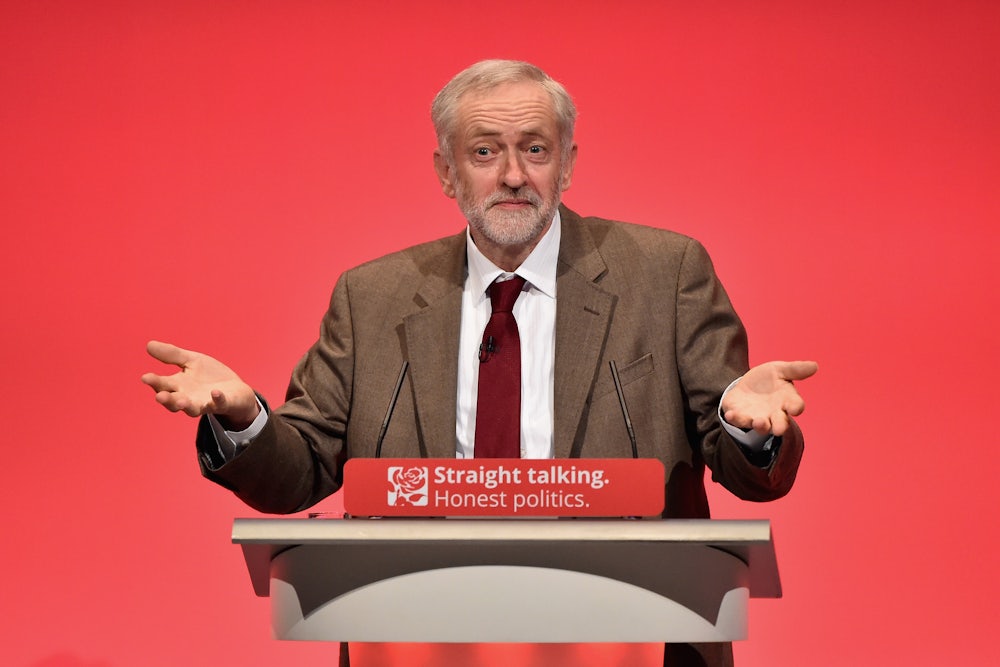Jeremy Corbyn may have hung the British Parliament. In doing so, the Labour Party leader defied most expectations, but his success should not be such a shock—and provides a lesson for American progressives. Corbyn deprived Theresa May of the Conservative majority, which she had hoped to expand with Thursday’s snap-election, with a vibrantly left-wing rejection of austerity.
Labour’s challenge will be to maintain its momentum. But May’s earliest moves already secured the likelihood of another backlash to her government: She is attempting to form a coalition government with Northern Ireland’s Democratic Unionist Party, which once launched a campaign to “Save Ulster from Sodomy” and vigorously opposed marriage equality and abortion rights. May’s catastrophic performance only left her with the option to pivot further right and away from the youth vote that supported Labour. The left should never rest too confidently in victory, but it is in a strong position to reclaim the government from Tory rule.
This contradicts predictions from a number of liberal British commentators and from Labour’s centrist faction. In April, commentator Nick Cohen warned Corbynites: “You don’t have a radical programme that a 20th-century Marxist or any other serious thinker would recognise. All that’s left of the far left is a babble of sneers and slogans.” Former Prime Minister Tony Blair repeatedly refused to endorse Corbyn, saying in April that the Labour leader posed “zero” threat to Theresa May’s government. “My view about the right-wing populism is very, very clear. It can only be defeated by progressive forces building out from the center,” he told Politico. Après moi, le déluge.
And what a flood it is! Corbyn won more seats than Ed Miliband did in 2015. The Evening Standard reports that it was the party’s biggest vote share since Blair’s 2001 win, and according to The Independent a larger share than the victory that put Blair in 10 Downing Street in 2005. Exit polling projects that youth turnout increased 12 points from Miliband’s shambolic performance in 2015, a reaction to Brexit and to the Conservative Party’s austerity kink. But Labour’s success is not restricted to youth. It won gains in deeply conservative areas, unseating Conservatives in Canterbury and likely Kensington—two seats the party’s never held. In Ipswich, they unseated Brian Gummer, who wrote the Conservatives’ electoral manifesto.
The parallels between British and American politics are obviously inexact, but they do exist. Like America, the U.K. is recovering from a shock victory for the populist right. It sits crushed by a conservative government unapologetically committed to a platform of austerity; Trump’s infamous skinny budget is a Tory wet dream. Tories are steadily whittling the U.K. welfare state down to nothing, bleeding the poor while bloating the rich. And if Labour had adopted the tactics of the Democratic Party—if it had run a centrist candidate, if it had dismissed cries for equitable access to health care and education as the utopian ambitions of misguided youth—then Theresa May would likely have a majority government.
There are lessons here, if Democrats wish to learn them. But they will have to radically reorient the party. Health care is their best wedge issue: Trumpcare is unpopular, and the Affordable Care Act, though inadequate, is a tangible benefit that voters are reluctant to lose. The party should similarly focus on youth turnout, and that means paying more attention to the policies of Senator Bernie Sanders: free public college tuition (not Andrew Cuomo’s milquetoast alternative), and student debt forgiveness. That’s how you win young voters.
Democrats face a difficult path to victory. So did Labour, but it achieved massive gains by putting forward an authentically progressive manifesto that promised tangible improvements to people’s lives. They positioned themselves unapologetically in accordance with their name: They are the party of labor, and not of capital, and so they are the party of the many and not the few. They did not shirk from utopianism, or from hope; they treated young and old alike with serious consideration, and made reasoned, convincing appeals for their votes.
